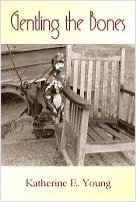

Reviews
Katherine E. Young's Gentling the Bones
 Katherine E. Young's Gentling the Bones
Katherine E. Young's Gentling the Bones
Finishing Line Press 2007; 27 pages; $12
ISBN 978-1-59924-221-7, Paper
http://www.finishinglinepress.com
by Janet McCann
Gentling the Bones is a memorable poetry collection that explores the intersection of family and history with skill and imagination. Some of the poems have to do with the Southern heritage and the present state of Southern life; others concern more recent events and more varied locales. The Southern poems are particularly appealing. Fragments of old family documents introduce meditations on the slave-holding past and the experiences of both oppressors and oppressed. Later days are sketched in poems such as "Burning Down the Slave Quarters," in which the speaker thinks about the possibility of learning something about the past through going through the debris of the old building looking for tokens — but she never gets around to it, and lets the fire crews erase this part of the past without examining it. The ghosts of history emerge in these carefully crafted free-verse poems, which build up a complex appraisal of the antebellum world.
Not all the poems are about the South; some have to do with friendship, the hurricane, 9/11, Canada, and other topics. But the reader keeps going back to the southern poems because these have a freshness and complexity that stamps them with authenticity. Some of them concern recent events and events of current family life, hitched, though, to the past. In one of the most appealing poems, "The Snake," the speaker while with her parents and young son sees a snake that appears a beauty of nature to her.
The snake gazed at my son, glinting jet
against green-gold skin, the tiny forked tongue
flickering delicate, speculative
in the morning sun.
Her father immediately kills the snake, with instructions for proper snake-killing; when she whispers to her mother that the snake had been beautiful, the mother responds, "It's something he can/ control," not like threats in his life that are less tangible. There are other important elements of the poem, but this interchange reminds me of "Mending Wall" — one kind of mind simply cannot perceive certain kinds of beauty, promises of nature, while another can. Yet the poem leaves the thought that as time passes, knowledge and experience grow, and that the speaker's son is entering into a world with more possibility than that of her father.
The cover photo by Kristin Hansen is teasing and attractive, as a weathered rocking chair sits next to a peeling iron decaying soldier and some piece of old machinery. Of this mysterious photo, Young commented, "I looked through literally hundreds of photos by several different photographers for this cover, am very happy indeed with this one. I like to think of that soldier figure as the original Young (the inept father/farmer in the title poem, and in 'By Way of a Prologue'), befuddled and bemused by what has occurred over the succeeding generations, all of it stemming from his quixotic decision to journey to America."
History, family, and family history are insightfully examined in poems that are a pleasure to read and to discuss. They are intriguing in part because of their self-awareness as imagined scenes. The surface of the "real" past, that is, the detail available directly through observation and hearsay, emphasizes its ordinariness—as in the end of "Butterflies":
Out in the kitchen, Grandma revisits
her old wrongs: what Cousin Gert said that time
in 'thirty four, how she settled Gert's hash...
In the yard, a collection of wagon
wheels, sprung from axles and fixed in paint,
pinned like dead butterflies to the fenceposts.
Yet the recreated imagined past has a freshness and vitality that goes beyond the surface detail.
The poems of Gentling the Bones are not only about the speaker's southernness but about the act of reinventing it, the romance of history. We see the formation of particular images of the past, viewed from a certain angle. This chapbook makes a fine debut for poet Katherine Young.
Janet McCann's poems have been published in Kansas Quaterly, Parnassus, Nimrod, Sou'wester, New York Quarterly, Tendril, Poetry Australia, and many others. She has won three chapbook contests, sponsored by Pudding Publications, Chimera Connections, and Franciscan University Press. A 1989 NEA Creative Writing Fellowship winner, McCann has taught at Texas A & M University since 1969 and co-edited the anthologies, Odd Angles of Heaven (Shaw Publishers, 1994) and Place of Passage ( Story Line, 2000). Her most recent poetry collection: Emily's Dress (Pecan Grove Press, 2004).